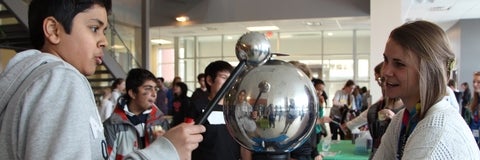Let’s Talk Science provides a unique opportunity for you to invite University of Waterloo Science student volunteers into your classroom to conduct fun, curriculum-aligned, hands-on science activities with your students at no cost to you or your school. The workshops that we currently offer to Grade 1-8 classrooms and community groups are listed below and in the Grade-specific table above. Please visit the Let's Talk Science workshop request form to register your class for a visit.
Building Bugs (Gr 2, 60 min.): How are living things adapted for survival? Design the best bug, for various environments! Students learn about the form and function of various insect.
Crime Labs: (Gr 5, 75 min.) Crime Scene Investigation may seem like it really only happens in movies and TV shows but forensic science applies various disciplines of science like chemistry and biology to find and test evidence to help solve cases. Students apply their science knowledge as members of the forensic team who were hired to find a thief in this fun problem-solving whodunnit.
Earthquake! (Gr 3, 60 min.): Oh no! There’s an earthquake! Wait, what even is an earthquake? Students learn how and why earthquakes happen and about the technologies that allow structures to resist an earthquake’s powerful force. They then build and test their earthquake-resistant structures on earthquake tables.
Energy Exploration (Gr 1, 60 min.): Use your senses to categorize and investigate different types of energy and find out where energy comes from.
Entrepreneurial Science (Gr 7-8, 75 min.): Students learn about the economics of science by forming companies to design self-propelled objects. Teams design, 'purchase' parts, build, and test their creations.
Exploration Mars (Gr 6, 60 min.): Experience the challenges of space exploration using unmanned space probes. Explore different types of space probes - Orbiters, Landers, and Rovers. Students will build and test a lander in hopes of discovering new information about Mars and whether it could ever have supported life!
Fight or Flight (Gr 5, 60 min.): Grown-ups are not the only ones who experience stress - kids get stressed too! Students explore what happens in their nervous system, endocrine system, and circulatory system when their brain detects stressful situations. Students will also discuss ways to identify, reduce, and manage stress in their lives.
High Flyers (Gr 6, 60 min.): Explore various aspects of flight and how machines and birds are able to achieve efficient flight. Discuss “what forces act on a plane”, “what causes lift in a plane”, and “how do different wing shapes help achieve different types of flight”. Students will apply their knowledge by building and testing various paper planes in an ultimate paper plane building championship.
Make a Splash (Gr 8, 60 min.): Students roleplay as an advisory committee for the Grand River watershed and make decisions that will impact water availability and water quality in the region. Students will then complete a hands-on water quality investigation.
Matter Matters (Gr 2, 75 min.): Students explore the properties of solids, liquids, and gases and their interactions in exciting hands-on stations.
Mix It Up (Gr 7, 75 min.): Test your knowledge of properties of matter as students try to break into our states of matter lockbox! Students explore why some things dissolve and not others, how particles interact with each other and how we can use separation techniques in the real world.
Pulling Your Weight (Gr 4, 60 min.): There's hard work to be done! Which machine will make your work easier? Students problem-solve and learn about gears, pulleys and ramps.
Raindrop Roundup (Gr 8, 75 min.): Monitoring rainfall is essential for successful farming operations, climate change tracking and much more! Students will learn about how and why we track rainfall through hands-on activities with an optional community science project your class can continue to participate in for the school year!
Root of the Matter (Gr 3, 75 min.): Within a species, plants show remarkable diversity. Learn about the adaptations within known food plants, and how your bean plant will survive different scenarios (e.g. drought, frost, pests).
Wetland Food Web (Gr 4-6, 60 min.): Examining the biodiversity within a wetland ecosystem, students learn how all living things are connected and used in energy pyramids that can alter various habitats and communities.
Zooming In (Gr 8, 60 min.): Students are introduced to parts of a cell through hands-on activities exploring properties of cellular membranes and walls, cell size, and cellular gas production.
